
The third part in the holy trinity of dynamic duo Rachel O’Riordan & Gary Owen’s co-productions, and the jewel in their collaborative crown, is their adaptation of Anton Chekhov’s The Cherry Orchard, seamlessly updated from pre-Revolution Russia to Thatcherian Pembrokeshire.
Centring on a family of wealthy landowners just as their luck and lucre begin to dwindle, the updated Cherry Orchard follows the return of boozy, bombastic matriarch Rainey to her childhood home mere days before it’s to be sold at auction. Her reappearance heralds an era of chaos, confusion and uncertainty, not just in her personal relationships but in creating a complex and combustible legal situation that threatens the stability of her nearest and dearest. Over all hangs the spectre of Mrs Thatcher, promising the working-class freedom with one hand, and mass unemployment with the other.
Rachel O’Riordan deftly directs the excellent ensemble, expertly exhuming the characters’ inner demons in a way that is interesting and realistic, but not clumsy or banal – a tricky line to navigate. Gary Owen adds heart and humour in his adaptation of Chekhov’s play; Owen’s version is not just more accessible than its source, but often improves on the original through its use of language, and its inclusion of Gothic undertones (spectral trains and ghostly children appear infrequently). O’Riordan and Owen work in tandem to ensure that we not only know these characters as well as our own families by the close of play, but that there are still myriad mysteries to uncover about the complex cast left after the curtain (metaphorically) falls.
The cast itself capably carries a modern audience through the dual layers of antiquity: first, to the 1980s, which have evolved into a sort of nostalgic Eden in pop culture thanks to the influence of Stranger Things, Stephen King’s It, and Guardians of the Galaxy to name but a few; and secondly, to the chequered past of Chekhov’s turn of the (20th) century Russia.

The linchpin of the piece is Denise Black’s winning, wine-soaked wonder Rainey, sauntering through life with a perpetual cigarette/ alcohol combination in hand. Her brash bravado and devil-may-care allure masterfully conceals the pain of her young son’s death, and the guilt she feels at her (careless, not calculated) part in his passing. A role that could easily slide into caricature is rendered relatable, realistic, and raw courtesy of Black’s amazing acting.
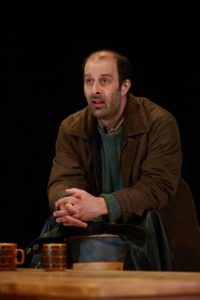
Matthew Bulgo excels as Lewis, a relatable downtrodden everyman who slowly sheds his skin to reveal a treacherous snake beneath. His cheerful ordinariness in the first act becomes tainted by the insidiousness of his ultimate decision, and the moment in which he strides around Rainey’s house proclaiming ‘these are my floors’ is particularly haunting.
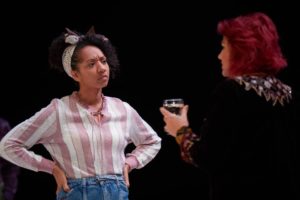
A star-making turn by Alexandria Riley as Dottie gives the production a bold, beating heart. She is snarky, sarcastic, self-assured and frequently takes her wealthy employers down a peg with her biting insight about their whiny, work-shy ways. Although Riley injects a grounded grumpiness to the family’s affluent antics, she revels in revealing the hidden, hurt soul behind the bolshy brashness. Her relationship with Rainey is truly touching, and anchors the action with emotion – more than Rainey ever shows her other daughters.
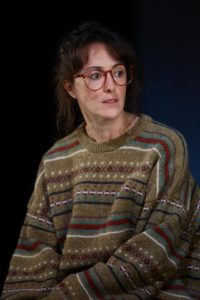
Speaking of which, Hedydd Dylan and Morfydd Clark cleverly act as clear counterparts to one another – Dylan is Valerie, treading a delicate line as the exasperated, underrated eldest (adopted) daughter of Rainey. Although she often seems the coldest and most clinical of the bunch, chinks in her armour gradually appear, revealing a deep need to be loved by Rainey that the object of her desire – tragically – cannot fulfil. Clark is Anya, Rainey’s youngest (and only) biological daughter. Anya is the complete opposite of the uptight Valerie – free-spirited, defiant and romantically adventurous (whereas Valerie pins her romantic future on a friend of the family who’s been there all her life). Clark does a lot of heavy lifting with lyrical ease; as her character has the most monologues, she often has to wax poetic about the heady nostalgia of the past – she is the chronicler of the piece, the notary of nostalgia who ensures no-one forgets how precious the eponymous orchard is to the family: as a symbol, a cipher, and, ultimately, a swan song.
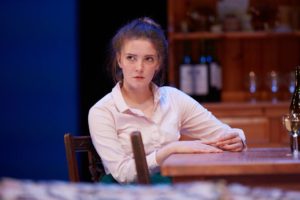
Richard Mylan plays Ceri, Anya’s former A-Level tutor with whom she reunites and (impulsively) romances, despite the fact that Anya has a stable, loving (and ostensibly rich) girlfriend back in Uni. Mylan plays Ceri with a potent combination of socialist vigour and musical snobbery that would make millennial hipsters blush. He probably has ‘Disaffected Youth’ tattooed in his soul, and he’s clearly relishing every second of acting like Sid Vicious and Michael Sheen’s lovechild. From the second he struts onto the stage clad in black from his boots to his leather-jacket and era-appropriate mop-top, you know exactly the kind of guy he is. Except you don’t, because halfway through the play, after denouncing once-beloved bands for signing to a label and selling out to ‘The Man’™, he abruptly announces his long-held desire to start his own record label, cheerfully (and obliviously) selling out in the exactly the way he just condemned.

My only disappointment in the adaptation of characters was that of Gabriel. Despite being thoughtfully and subtly portrayed by Simon Armstrong, his translation from Chekhov to this play was the only one which fell flat for me. In both he represents the laziness of the wealthy who don’t need to work to live – and Gabriel’s news of a (potentially fraudulent) career choice is poorly received by his relatives, and his failure seems inevitable However, the tragedy of Chekhov’s Gabriel was that he spoke a lot of sense, despite the fact that his relatives often shushed him mid-maxim. They find him annoying, we find him insightful. In this adaptation, Gabriel is demoted to doddery window dressing, and denied the musings his original counterpart was given in spades.
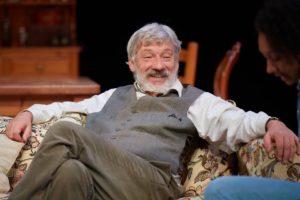
I had the pleasure of being on the post-show discussion panel on 24th October; led by Timothy Howe, the Sherman Theatre’s resident Communities and Engagement Coordinator, the panel consisted of Gary Owen himself, Dr Tristan Hughes (a senior lecturer in Literature at Cardiff University), and myself. I was there to represent Law and Literature, a field of study which boasts two complementary strands of thought: firstly, Law in Literature, which looks at how law is portrayed in literary texts; and secondly Law as Literature, in which legal texts are analysed using literary tools of interpretation. The Law and Literature module at Cardiff School of Law and Politics, led by Professors John Harrington and Ambreena Manji, have been linked up with the Sherman Theatre since 2016, incorporating their productions of Love Lies and Taxidermy, and now the Cherry Orchard, into the module over the last two years, offering a fantastic opportunity for students to not only study the texts, but see them performed live – and starting off discussions as to the parallels between performing law and performing theatre.
The post-show panel discussion was a hoot! Gothic sensibilities were touched on, Chekhov’s ghost was invoked, and new terms were coined – ‘melancomedy’, i.e. melancholy comedy, rather than a comedy about melons. One of the topics discussed was the evocative use of sound and imagery in the play; for me, the most striking image was the doorway from the house – dual monoliths illuminated from within by an afterlife-inspired white light. It was as if the living room from Roseanne led out into the stairway to heaven in A Matter of Life and Death. Juxtaposing the homely with the heavenly was an inspired piece of stage production, and gave the play an almost supernatural quality that was only enhanced by the occasional appearance of the spiritual presences mentioned above. Tristan and I exchanged Gothic interpretations of the play, and he felt that the most striking moment of the play was the haunting sound of the siren that heralded war with Argentina. A similarly chilling noise was the sound of the cherry orchard being chopped down offstage, the axe cutting into wood with a visceral thud akin to the sound of breaking bones and severed flesh, as if being murdered – very Gothic indeed.
Looking at the play using the lens of Law and Literature allows the legal aspects to shine under literary interpretation and vice versa. It was fascinating to watch how the play represents lots of different aspects of law: land law, family law (particularly adoption law), and contracts. I can assure you from experience that land law is one of the driest, dullest and yet most important and practical facets of the entire legal system. Memories of studying it at undergrad bring flashbacks of long, lethargic legal spiel, volumes upon volumes; it certainly felt like I was reading them in perpetuity. But the Cherry Orchard, in bringing complex legal issues like land law into the context of characters you care for and empathise with, was a paragon of Law in Literature – it represented the legal (and political) issues of the day, making them relatable and understandable, as well as informing us of the legal consequences through characters whose futures we grew to worry about.
There were doubles a go-go in this show (of particular interest to my Doppelganger-centric PhD). For a start, Dottie, Ceri and Lewis acted as the lower-class literary foils to the upper-class Rainey and co. Whereas Rainey and Anya want to keep the orchard for themselves, Lewis plots to buy the land and transform it into council houses thanks to Maggie Thatcher’s new scheme. Rainey and Anya want to linger in the home of their charmed childhoods, Dottie thinks they just don’t want lower-class people like her living next door; the response couldn’t be more insulting when Rainey effectively claims Dottie’s ‘one of the good ones’, a racist, classist sentiment that Dottie rightfully rails against. It only reinforces the fact that Dottie was spot on about their reasoning. Whereas Dottie works within the system to provide for herself and her family, Ceri fights against it, proclaiming the power of the proletariat – whilst dating a rich girl. I mean, the two aren’t mutually exclusive, but it does somewhat foreshadow his forsaking his principles later on, just as he thinks going late to the dole office is a middle finger to authority. Gabriel is the most passive character of the play, and has no active involvement in the action – well-meaning but weightless. Not to mention the obvious doubles running through the play – ‘I’m a ghost. I’m not here’, Rainey whispers, feeling that she died in spirit when her son did’. The ghostly segments often feel like an afterthought, and I would have liked to explore them more – though, as they are now, they act as spectres of the past, relics and afterthoughts – and as such, they’re in good company with Rainey and her ghosts of love and luxury.
I can’t rave about this show enough. It is a triumph for those involved in making it, and a treat for those lucky enough to see it.

Barbara Hughes-Moore
Tag Archives: The Cherry Orchard
Review The Cherry Orchard, Sherman Theatre by Kevin Johnson
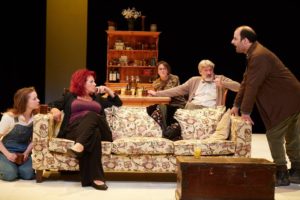
This is not a new version of the Chekhov classic, but a ‘re-imagining’ by Welsh writer Gary Owen, of Killology & Iphigenia In Splott fame. Owen relocates it from 1890’s Russia to the Pembroke coast in 1982, just prior to the Falklands War, which makes for a very interesting choice.
It feels like every dysfunctional family drama you’ve ever seen, until you realise Chekhov originated the idea of real characters, with real problems, talking like real people.

Family matriarch Rainey, who has crawled into a bottle after the death of her son over a decade ago, followed soon after by the suicide of her husband, is virtually dragged back to the family home from London by Anya, her youngest daughter. Her self-destructive lifestyle has lead to the family home on the Pembroke coast being auctioned off to pay the debts.
Val, her eldest daughter, has held things together, but they need Raynie’s permission (and signature) to save it. All agree that the only viable option is to sell off the ancestral cherry orchard for redevelopment, but will she see it that way?
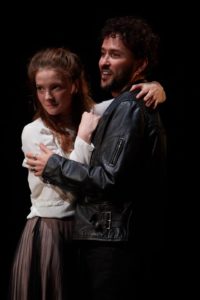
This play is incredibly funny and well-worth seeing, if only for the way Owen makes it so accessible to Welsh eyes. The ‘Russian peasants’ now come from housing estates, the decaying aristocracy are English interlopers, and the Communist revolutionaries are now Thatcherites, sweeping the past away without a thought or concern.
At the heart of the play is the idea that the future is farther away than we hope, while the past is always closer than we’d like. The characters here are continually haunted, not by spirits, but by the ghosts of memories, taunting them with remembrance.
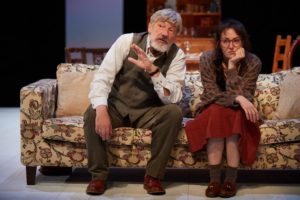
Rainey tries to forget through excess, her guilt at losing her son gnawing away at her, like a rat sown inside her skin. In the end it causes her to take drastic action, and Denise Black brings all this out in a masterful performance that makes you feel sorry for her, even while she’s being a monster to all and sundry.
The entire cast take their moments when offered, yet still make this a true ensemble piece. Morfydd Clark is sweetly sensual as the young Anya, while Hedydd Dylan as her elder sister Val, shows us a woman who tries to run other people’s lives, but fails at her own.
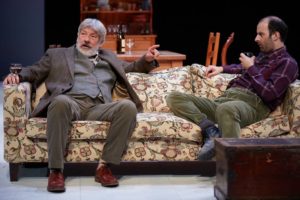
Simon Armstrong as Gabe, Rainey’s brother, is amusingly ineffectual, yet quietly sharp. When Val talks about Rainey not telling him about her plans to leave he replies “We’ve been brother & sister half a century. Through awful things. Do you think saying ‘goodbye’ makes any difference?”
Alexandria Riley gives us a Dottie that is down to earth yet shows the love/hate relationship she has with the family, while Richard Mylan is funny, while also imparting a wise naïveté to Ceri.
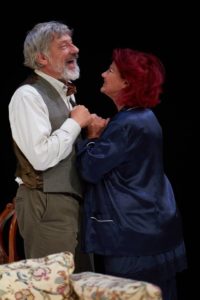
Mathew Bulgo, given the task of Lewis, the ‘poor boy made good’, effects a performance of subtlety that defies the historical villain the role has been seen as. With the insults he endures from the others, and denied the role of ‘family saviour’ by Rainey, it’s hard not to feel sympathy for him.
Writer Gary Owen conveys a situation full of layers, and also offers some nice ironies. Ceri’s expectations of Margaret Thatcher getting the blame for the Falklands War being one, Gabe’s job offer as an investment banker another.
When you add all this to Rachel O’Riordan’s deft direction, Kenny Miller’s intriguingly skewed set, and Kevin Tracey’s ingenious lighting, the Sherman Theatre demonstrates yet again that it is punching well above its weight in the theatre world.
There is so much going on here that I actually re-read the script in one go afterwards, and was still as gripped as I was by seeing it. The play is funny, ironic, witty, sarcastic and quietly heartbreaking. It is a story of loss, of people, places and things, and how memories both haunt and define us.
As F. Scott Fitzgerald once observed: ‘We beat on, boats against the current, borne back ceaselessly into the past‘.
http://www.shermantheatre.co.uk/performance/theatre/the-cherry-orchard/

Kevin Johnson
